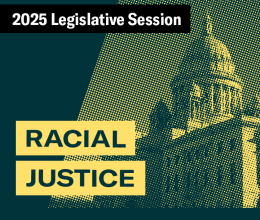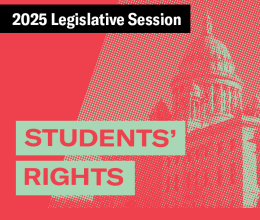Attorneys for the ACLU of Rhode Island and R.I. Legal Services (RILS) today filed a lawsuit against the Providence School District for hiding information about its extensive violations of the rights of English Language Learner (EL) students that led to a settlement agreement between the school system and the U.S. Department of Justice (DOJ) more than a year ago.
The Access to Public Records Act (APRA) lawsuit seeks a court order requiring the school district to release the DOJ documents identifying the various violations of federal law committed by the school district, which are referenced in the detailed settlement agreement.
In March, the City refused a request from RILS for a copy of the DOJ’s fact-finding documents by claiming, among other things, that the records were “protected by the attorney-client privilege” and constituted “preliminary drafts” exempt from disclosure under APRA. However, the lawsuit notes that since “the United States is the federal agency responsible for investigating” the school district, there was no attorney-client relationship to assert, and that there is nothing preliminary about “the final findings of the U.S. Department of Justice.”
The 22-page settlement agreement, entered last August, acknowledges that the Department of Justice had found a dozen violations of federal law, including the school district’s placement of “hundreds of ELs in schools that lacked EL services without obtaining the parent’s voluntary and informed waivers of these services,” its use of “an educationally unsound EL program,” and its failure “to staff its EL programs with enough qualified teachers.”
The devastating critique of the Providence school system issued by the Johns Hopkins School of Education two months ago quoted numerous professionals raising concerns about the adequacy of the district’s EL programs. In proposing a takeover of the Providence school system by the state earlier this month, R.I. Department of Education Commissioner of Education Angélica Infante-Green cited those comments along with the DOJ settlement agreement as a basis for the takeover, noting that it “does not appear that this systemic and district-wide problem has improved.”
The lawsuit, filed by ACLU of RI cooperating attorney Ellen Saideman and RILS staff attorney Veronika Kot, who filed the APRA request for the documents, seeks a court order requiring the immediate release of the requested records, imposing a fine on the city and awarding attorneys fees.
RILS attorney Kot said today: “English Learners in Providence have long been deprived of the language access services to which they are entitled by law and which they need to achieve academically. It’s time to bring some transparency to the process. The full findings of the Department of Justice, which form the basis for its Settlement Agreement with Providence with regard to EL services, would shine a light on identified deficiencies in services and help close achievement gaps as the State begins to implement reforms in the District. The families of Providence students deserve no less.”
ACLU attorney Saideman added: “Providence is compounding its deficient services for EL students with blatant violations of Rhode Island’s public records laws. The public is entitled to know what the Department of Justice found regarding the EL programs operated by Providence. Obviously, Providence wants to conceal this information from the public. The first step in fixing a problem is to admit it. To fix the EL program, we need to know what Providence has done wrong. The DOJ Findings are important public information.”
ACLU of RI executive director Steven Brown stated: “The rationales offered by the City for keeping this critical information secret border on the frivolous. The public deserves a better commitment to transparency from the largest city government in the state.”
When the settlement agreement was announced last year, City Council members objected that they had been kept in the dark about the DOJ investigation and its findings, making the City administration’s persistence in hiding deficiencies in its EL program even more troubling.




